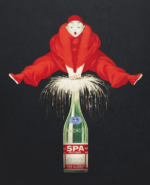Ronny Heiremans and Katleen Vermeir take us for two walks in SPA in the context of their research ‘7 WALKS (resolution)’. The context of SPA offers the unique opportunity for a series of itinerant reflections on water and art. Drawing inspiration from the intangible legacy of historical walkers — kings and czars, political refugees, artists and philosophers — and, strongly anchored in a local context, Heiremans and Vermeir propose to explore a balance between private property of and access to resources that we hold in common as a society. Can SPA inspire to unbundle the proprietary rights that have been stacked around authorship and (land) ownership, i.e. two paramount features of Western subjectivity?
7 WALKS (resolution) consists of a series of public walks in the therapeutical landscape around the city of SPA. Spa became renowned for its medicinal water as early as the 16th century. Its ferruginous springs not only attracted many visitors, it was also exported internationally. Gradually the city became the so-called 'Café de l'Europe'. Visited by kings and czars, political refugees, artists and philosophers, it was a peaceful haven where a wide range of philosophies, social questions and artistic visions could interact. The 'bobelins', as the locals used to call these international visitors, walked through the surrounding forests, along landscaped paths on their way to the springs. They came to see and be seen, for diplomacy or espionage, and even for the arts. The local painter Antoine Fontaine depicted these illustrious visitors in Le Livre d'Or (1894), a 9 metres wide group portrait spanning four centuries of visitors.
7 WALKS (resolution) draws inspiration from the intangible legacy of historical walkers and, strongly anchored in a local context, invites its participants to explore a balance between private property of and access to resources that we hold in common as a society. Spa offers the project the unique opportunity for a series of itinerant reflections on water and art.
7 WALKS (resolution) responds to current and recently intensified debates about the necessity and position of art in today's society. Like water, art can be considered a basic necessity of life, a proposal that many international resolutions have promoted. The project questions how basic human rights enter into dialogue with individual private property- and exclusive use rights. To discuss these questions Vermeir & Heiremans and Luke Mason will be joined by participants and guest walkers David Aubin, Steyn Bergs, Marie-Sophie de Clippele, Françoise Jurion, Ulrich Kriese, Anne Pirard, Scott Raby, Christoph Rausch, Marie-Christine Schils, Julie Van Elslande, Jens Van Lathem, Tobias Van Royen,...
CAPTURING WATER FROM THE ARTISTS’ SOURCE
Walk#07_Promenade des Artistes, Pouhon Delcor to Promenade Cherville to Waux-Hall
Thursday 16 September 2021, 2 to 6pm
Dedicated to the many artists active in Spa in the 19th century the Promenade d'Artistes was inaugurated in 1849. The trail follows the valley of the Picherotte, a small stream that runs down from the wooded hills. At the beginning of the trail we come across one of the many capture points of Spa Monopole, the enterprise that has been bottling and exporting the communal mineral water sources since 1921. A discussion on common property and use rights of the waters extends to one on immaterial goods and services, like the arts.
A CONSPIRACY OF EQUALS IN SPA?
Walk#08_To Promenade Deschanel and Frahinfaz, further to Balmoral, back via Promenade Arago.
Friday 17 September 2021, 11 to 5pm
Mid 19th century Belgium was hospitable to many French political refugees. Among them we find Emile Deschanel, Etienne Arago, P.J.Proudhon, Victor Hugo, Jules Hetzel, Henri Rochefort, Edgar Quinet and others. They found a friend in journalist Felix Delhasse who hosted many of them in Spa. Delhasse was part of the secret society La Charbonnerie and was a disciple of its founder Filippo Buonarotti. Buonorotti’s text ‘The History of the Conspiracy of Equals’ related the failed coup of Grachus Babeuf in 1796. Babeuf rejected the notion that equality before the law itself was sufficient to define societal equality, and thus placed a strong emphasis on the abolition of private property and on equal access to food. Walking the Promenades dedicated to Arago, Deschanel and Hetzel, we end our walk in Rue Delhasse.
The videos and installations of the artist duo Vermeir & Heiremans investigate the complex relationship between art, economy and the built environment in today’s highly globalized world. The artists define their own house as an artwork. The 'house as artwork' functions as a framing device that allows the artists to zoom in on the role the arts play within the ever-growing entanglement between finance, urban development and governing. Their practice employs financial tools, historical references, technology, and cinematic language to reflect on social codes as well as on the production of value in today’s artistic and non-artistic realms.


